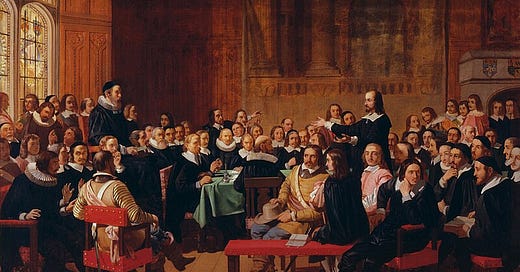This is part 1 of 7 articles explaining what is Presbyterianism.
Table of Contents
Part 2
Part 3
What Is It?
Names are not always helpful. “Presbyterian” only defines the church government that we believe in. “Baptist” only states the sole acceptable mode that Baptists believe in.
The following are distinctions of Presbyterianism that aren’t just our beliefs in infant baptism and our form of church polity. This is a resource to explain Presbyterianism and why Traditions for the Future is here to pass it on.
This first post will be pinned to the top of The Presbyterian Whetstone. This post is mutable. As time goes on, I will edit and add to it. Check back every so often to see the changes and revisions. This is by no means the final product. As the other articles are published, I will make a table of contents here.
God-Centered Worldview
The foundation and aim of all our thought is God Himself. As Calvin said in the opening lines of The Institutes of the Christian Religion, “Our wisdom, in so far as it ought to be deemed true and solid wisdom, consists almost entirely in two parts: the knowledge of God and of ourselves.”1 We are after Him! All of what we are to do and believe concerning Him is prescribed by Him. He is our Lord and our Affection.
The authority of the Holy Scriptures is not founded upon the reason of man or any good arguments. The authority of Holy Scriptures is founded upon God Himself because He is their author. The Word is where God reveals His nature and character. No other authority may we turn to and rely wholly upon.
For Christ spoke in Matthew 23:8-10 (ESV) saying:
But you are not to be called rabbi, for you have one teacher, and you are all brothers. And no man call you father on earth, for you have one Father, who is in heaven. Neither be called instructors, for you have one instructor, the Christ.
It is repeated twice to emphasize this: Christ Alone is the Teacher of the Church. All of her doctrine is limited to what He has commanded, with no variance.
But Christ does not send His Doctrine out into the world alone, but sends the Spirit with it to enlighten men unto all truth (Matthew 28:19-20, John 14:26; 16:13).
The Triune God has spoken and we must listen. His Holy Scriptures have revealed, propounded, and commanded that we know and love Him. He alone is all-sufficient, not in need of any creature He has made, nor deriving any glory from them, but only manifesting His own glory in, by, unto, and upon them. He is the only fountain of all being, of whom, through whom, and to whom are all things; and has most sovereign dominion over them, to do by them, for them, or upon them whatsoever He pleases. In His sight all are open and manifest, His knowledge is infinite, infallible, and independent upon the creature, so as to Him nothing is contingent, or uncertain. He is most holy in all His counsels, in all His works, and in all His commands. To Him is due from angels and men, and every other creature, whatsoever worship, service, or obedience He is pleased to require of them.2
1.1.1, The Institutes of the Christian Religion by John Calvin. (My copy does not have a publication date and list the translator) It was originally published in 1536 and had many additions to it over time with the final being published in 1554.
Chapter 2.2, The Westminster Confession of Faith (1647)






